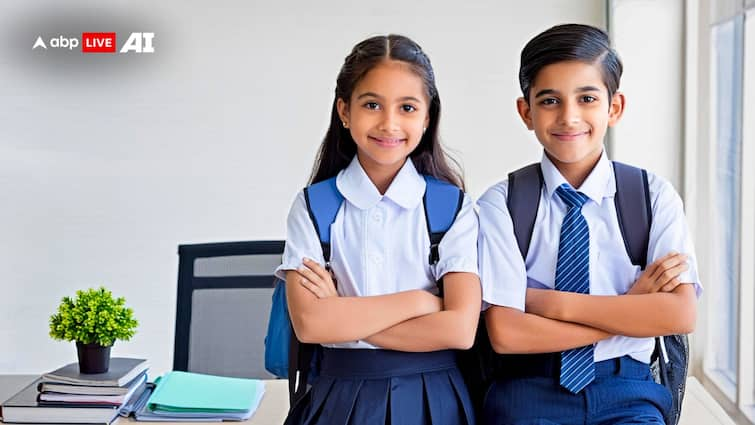Last Updated:
Education experts also flagged the need for a community-led model, where there are neighborhood hubs to take care of children, as they believe schools are exploiting the current necessity of parents to leave their children in a safe space while they are at work.
Middle and even upper middle-class parents of children as young as in nursery across cities are caught in the aspirational struggle of sending their children to a good school. (Getty Image for representation)
Rishabh Jain, a Jaipur-based entrepreneur and parent of a five-year-old, posted a picture of the exorbitant fee structure of one of the schools he was considering for his daughter on social media earlier this week, generating massive response from fellow parents. Over steep private school fees are becoming increasingly unaffordable for the middle and even the upper-middle classes.
Jain, an alumnus of IIT-Bombay, whose daughter will go to Class 1 next year, in his post on Fees, which is hiked every year by 10 per cent, it is not possible to pay for two kids even for those earning Rs 20 lakh a year.
Good education is a luxury – which middle class can not affordMy daughter will start Grade 1 next year, and this is the fee structure of one of the schools we are considering in our city. Note that other good schools also have similar fees.
– Registration Charges: ₹2,000-… pic.twitter.com/TvLql7mhOZ
— RJ – Rishabh Jain (@rishsamjain) November 17, 2024
Middle and even upper middle-class parents of children as young as in nursery across cities, including Delhi-NCR, Jaipur, Bengaluru, Hyderabad, Mumbai and Pune among others, are caught in the aspirational struggle of sending their children to a good school that provides quality teaching and modern facilities — a race that often ends with private schools.
Jain is just one of the thousands of parents in big cities who are facing a private school fees crisis. There are others who also spoke of the hidden and extra expenses charged by schools in the name of parent orientation fees, transportation fees, extracurricular activities, and multiple school uniforms that parents are forced to buy only from the school.
Rajan Govinda, a Bengaluru-based parent, said he has sought permission from his office to reach late daily so that he can drop off his children to school to avoid the high transportation fee. “The school in Marthahalli charges Rs 1.07 lakh annually as bus fees. Hence, I have taken permission for going late to office daily. The same school charges parent orientation/parent teacher meets fee of Rs 23,000 each year,” he said.
Another parent, Dharmesh Gupta, said the bus charges are around Rs 4,500-5,500 in Delhi-NCR for one child. All school buses run on CNG and are exempted from road tax and service tax. Despite this, schools raise charges every year, saying fuel prices have increased.
In Hyderabad, a parent wrote on social media that the bus fees is above Rs 50,000 annually and it's mandatory since the school does not allow parents to drop off their children. “I pay close to Rs 80,000 bus fees only for my kids' school,” said Gaurav Dutt, a resident of Gurgaon.
Data from the government's 2021-22 Unified District Information System for Education (UDISE) for major cities shows that teachers and students prefer private schools over government schools. Except in Delhi, across all cities, teachers seem to prefer to work in private schools.
'Need to balance aspirations'
Ameeta M Wattal, chairperson, DLF, QEC Schools and Scholarships, said parents these days have extreme aspirations, which need to be balanced with practicality and by what is good for their children. They are just looking for a brand name even when, at times, they do have a reasonably good school around them with nice infrastructure and qualified staff, she added.
“Parents come to a school and ask if the classrooms are air-conditioned, if there is an Olympic-size pool, a cricket pitch, a recording lab, an AI lab etc. There is an emphasis on technology these days. If a school must have all these modern facilities and staff to man them over and above the teachers' salaries, DA and other expenses, where is it going to get the money for the same? Parents forum can get together and raise their voice if a school is not delivering quality teaching yet raising the fee but, at the same time, parents too need to watch out their own aspirations and weigh their options well,” said Wattal.
Community-led schools, neighborhood hubs the way forward
Devishobha Chandramouli, a Hyderabad-based education researcher and founder of kidskintha.com, said the trend of ever-increasing school fees must change. “Private school education is slowly becoming unsustainable. There is a need to re-model. The main reason for this is that we are after Western models of education. For example, there is a European model or the New Zealand model that is being offered by schools. This is when we have an already good education system here in India. We must remove the colonial hangover. If we can leverage what is here and make it grassroots, we will see the change,” she said.
The new National Education Policy (NEP) is here, the basic premise of which was to democratise education, but it seems that it's a far-away goal, she said.
Moving away from this trend, cities need a community-led model, where there are neighborhood hubs to take care of children. “Schools are just exploiting the current necessity of parents to leave their children in a safe space while they are at work. We must harness age-old wisdom and depend on sustainable models in the future,” added Chandramouli.
Education experts shared the view of a gap in early childcare systems as well as no government regulation on it.
'High fees justified only if care is excellent'
Meeta Sengupta, an educationist and founder of the Center for Education Strategy in Delhi, said high fees are only justified if the care provided by the school is excellent and the staff is highly trained.
“In the early years, it takes an extremely qualified and highly trained person to take care of your child and enable the building of their psychological base since a child's psyche is the most delicate at that age. The school fees can be higher in the early care years and then it can go down, because once the base is ready, it's just learning that must take place. But, if you are paying high fees, the school must ensure that they are delivering excellent level of care. For example, if you have an ultra-confident nursery kid, then you will surely have them grow as confident adults. But, if the school is not able to provide that level of training to its staff, then it's certainly not justified to ask for such high fees, which in that case is just exploiting the parents' circumstances,” said Sengupta.
Also, she added, policy-wise, there is a gap in early childcare as half of the time, parents put their young children in school because there aren't enough early childcare facilities where they can leave them while they are at work. So, continuous training of staff, both teaching and caretaking, is required for higher levels of excellence in childcare.
'Government schools need to do better'
JS Rajput, former head of the National Council of Educational Research and Training (NCERT), said the race for private schools will go on so long as there are takers for it. The only solution is for governments at the central and state levels to come together and invest in improving their primary schools. “We have neglected our teachers in the government system. There needs to be intensive and constant training of teachers, especially in primary care and education. This is a major need for the future,” said Rajput.




